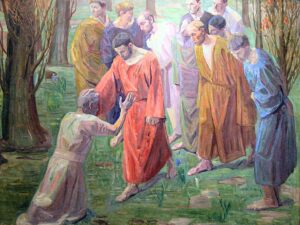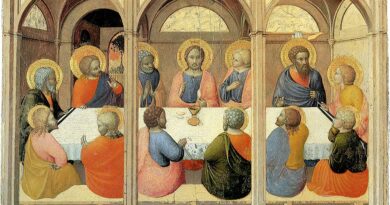XXVIIIth Sunday of Ordinary Time
Massimo Palombella

In today’s Gospel (Lk 17:11-19), as last Sunday, Jesus returns to the theme of faith, that is, the relationship of each of us with the true God.
In the story of the ten lepers healed and only one who goes back – the Samaritan – to thank Jesus, there is the crystal clear image of our relationship with God. In fact, in a logic of a God “invented” and “used” to make us well, the ten lepers are simply feel ok. In this logic, a “relationship” is not important but only “using” an invented god – or the people around us – to get what we want. It is a subtle and often imperceptible, but equally ruthless logic where everything is subservient to the achievement of our goals, and where, after all, there is no “trust”, and life is consumed in a sort of “bubble” where everything is absolutely and solely defined by us, including God.
The salvation produced by the faith of the one leper who returns to thank Jesus is precisely getting out of the aforementioned “bubble”, out of an invented world, not real, to begin to relate, to recognise reality, to invest our best energies not in defending ourselves and fighting to pursue our goals, but in living in abundance, in fullness.
The true God waits for us outside the “bubble” we repeatedly construct, waits for us without our nevrotic certainties, waits for us with our fears, with our lack of resolve to love us in reality, for what we really are, to offer us the true relationship with Him that is the only thing that allows our life to become worth living.
The Offertory antiphon of today’s celebration is taken from the book of Esther (chapter 14, verses 12. 13, in accordance with the “Vulgate” Bible according to the division into chapters by Langton, at the University of Paris in the 13th century, and into verses by Estienne, in his Latin Bible published in Geneva in 1555) with the following text:
“Recordare mei, Domine,
omni potentatui dominans,
et da sermonem rectum in os meum
ut placeant verba mea in conspectu principis”.
(Remember me, O Lord,
you who dominate all authority;
put the right words on my lips, so that my speech
may be convincing in the presence of the King).
The attached music, in Gregorian Chant, is taken from the Graduale Triplex published in Solesmes in 1979. The performance is by the “Schola Hungarica” conducted by Laszlo Dobszay. The music track can be found on the CD “The Offertory: Gregorian Chant And Palestrina” published by “Hungaroton” in 2002.
A blessed Sunday and heartfelt greetings.


